TRQ vs KYB Struts: Which Is Better For What
Stylethority is reader-supported. When you buy through links on the site, we may earn a commission.
Over the past ~5 years, TRQ gained some popularity in the entry-level aftermarket suspension niche. Obviously, comparisons to established brands were bound to happen.
In this case, we’ll be looking at TRQ vs KYB struts.
The main consideration is which KYB struts exactly. KYB bases its assemblies on the cheaper Excel G struts or the more premium Gas-A-Just.
Online info on the TRQ struts (see TRQ storefront) is shockingly scarce. I had to check the ones on a friend’s Durango. From what I saw, their design copies the Excel G, with several downgrades.
Here’s a quick overview:
| Product | Image | ||
|---|---|---|---|
|
Best pick for Japanese cars
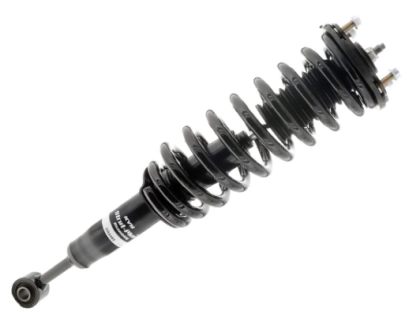
|
KYB Strut Plus (Excel G)
|
Check Prices & Fit |
| Product | Image | ||
|---|---|---|---|
|
Budget pick (Decent for US vehicles)
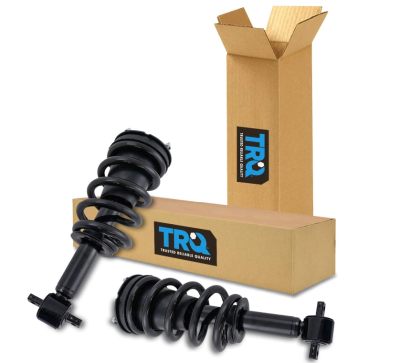
|
TRQ Strut Assembly
|
Check Price on AmazonCheck Price on 1A Auto |
TRQ struts vs KYB:
Target audience differences
Alright, so I’ve discussed this in separate posts, but to remind you again: KYB is the OEM manufacturer on a lot of Japanese vehicles.
Excel G is basically a buffed-up version of many Toyota, Honda, Lexus, etc. stock struts. It’s a stiffer version with improved wheel alignment, better cornering, and advanced oil sealing.
What I mean here is that the most optimal pick for any Japanese car won’t be the TRQ struts for sure. That would be the KYB with struts like this.
Even if both say OE-ready, the true OEM successor is the company who produced stock suspension in the first place.
That said, TRQ strut assemblies are a decent choice for American-made vehicles. This is why you’d see some generally favorable reviews on their US strut applications.
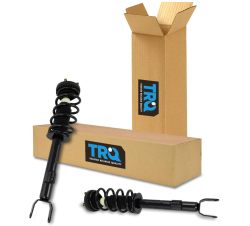
A very nice, affordable option if you want struts on Dodge Challenger, Charger or other Dodge models. Read the reviews to see what people have to say.
The friend with the Durango I asked, by the way, is the same guy running TRQ ignition coils. He said he’s generally content with the struts too.
The frustrating part is I can’t find any extra info on how these shocks are calibrated, valved, designed…Literally anything!
In comparison, with KYB you get anything from tables on compression/rebound rates to a full list of detailed strut features.
Ride feel, synthesis with your braking system, how do they accommodate larger tires, and similar important aspects.
For example, even before grabbing a set of Excel G, you know the brackets and strut body are thicker than standard. This helps them remain sturdy and rigid. It also supplements other perks like the reinforced piston rod.
What I assume is the following:
TRQ struts are a competitive response to other entry-level suspension manufacturers such as Detroit Axle.
Even compared to the cheapest KYB Excel G struts, TRQ is 20-30% cheaper. The struts emulate some of KYB’s features and cut down on the more premium ones to save costs.
The result is a ‘springy’ new suspension that will feel decent enough for non-picky car owners.
Now, if we’re talking TRQ vs KYB Gas-A-Just assemblies…no shot.
This particular KYB product is miles ahead of TRQ. Larger tire support, reinforced monotube design, and starkly improved damping capabilities are just a few reasons why.
I’ve written more on the Gas-A-just in my KYB comparison post. Just know that as far as TRQ is concerned, any TRQ assembly is subpar to KYB’s premium strut assemblies.
| Product | Image | ||
|---|---|---|---|
|
Extra durability & performance
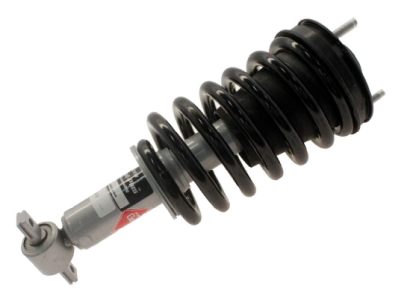
|
KYB Strut Plus (Gas-A-Just)
|
Check Prices & Fit |
Of course, there’s the price. TRQ is substantially cheaper, which leads us to the next section…
Who makes TRQ struts & where are they made?
TRQ strut assemblies are made by 1A Auto, from what I’ve seen. Up until a few years ago, they were mainly distributed on the retailer’s own website. Since then, their Amazon, CarID etc catalog has been expanding.
I’ve pointed out before that KYB has a complicated supply chain system. KYB struts have an equal chance to come from Mexico, Japan, China, Turkey, Taiwan…Even the US, actually.
The only thing we know about TRQ is that their struts are assembled and tested in Massachusetts. Obviously, this doesn’t mean that they’re made in the US. Otherwise, the brand would state so directly.
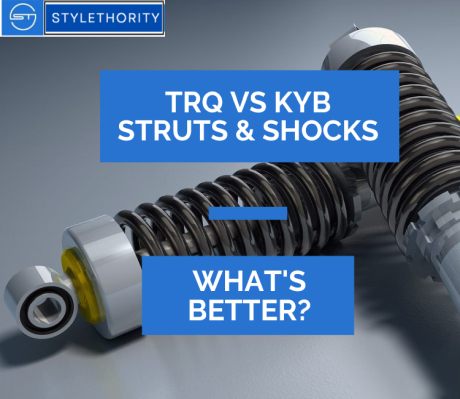
So at this point in time, I’d assume TRQ struts are made either in the popular China or Mexico production spots or perhaps Taiwan.
With a limited lifetime warranty, however, it’s obvious that the brand has trust in its struts. Otherwise, TRQ would slap a 5-year warranty and call it a day.
It’s not something limited to TRQ, either. In my post comparing these guys to Monroe, I explain how the latter often employs a similar outsourcing strategy.
One thing I want to commend TRQ for
As much as there’s scarcity on the actual design, valving, and performance of their shocks or struts, TRQ excel at something important:
Installation guides.
That’s right, over the past few years they’ve been absolutely great with posting DIY strut installation videos on YouTube.
For example, check this one. It showcases how to replace the strut assembly on a 2003-2009 Toyota 4Runner:
What I mean is that even if you skip on the TRQ struts for your vehicle, you can check out their channel. It’ll surely help you in figuring out the DIY suspension process.
Concluding the KYB vs TRQ debate
As I said, if you have a Japanese vehicle, just grab KYB. It doesn’t even have to be the more premium suspension options; the cheap Excel G will be better than TRQ anyways.
For other cars, and especially US-based ones, TRQ assemblies are a decent alternative. Just keep in mind you’ll be getting a slightly watered-down version of KYB struts to make up for the price difference.
That said, TRQ has been gaining traction. Especially with the economic downturn, a lot of people prefer affordable, entry-level suspension options.
In this sense, I fully see TRQ catching up to other popular brands filling this economy suspension niche. An example of such a brand is Detroit Axle – I’ve written about how they’ve been competing with Moog in some segments.
I envision both TRQ and Detroit Axle would slowly displace the no-name junk brands that offer shocks or struts with reduced warranty. For me, that’s a good thing. Just for the sake of God, guys, update your information and improve your marketing efforts!
- Woolx vs Smartwool: Discussing Some Details - October 4, 2023
- Best Struts For Honda Accord & Element: What Works - September 22, 2023
- Bilstein vs Monroe Shocks: My Opinion On What Works Best - September 19, 2023

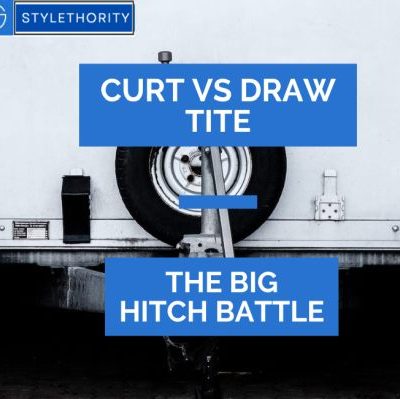
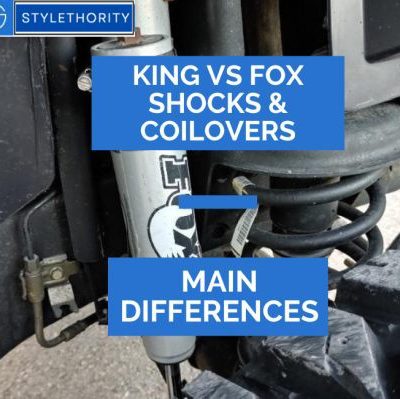
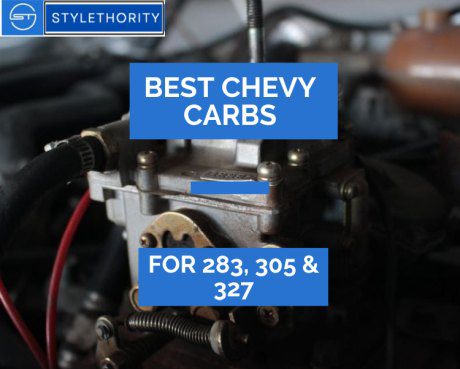
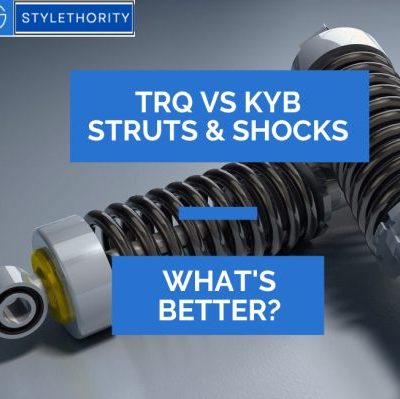
I prefer trq. Who wants to use the same car for more than 7 years?
Their parts is affordable and do the job and time for the price
TRQ is the worst DAMN product in the whole world, everything is felt on the road, I will never purchase this product again 😡😡😡😡😡
Hi Eric!
Sorry to hear you had such an experience. As I’ve written in my post, I’m more fond of KYB in many cases too. Especially the higher-end strut or shock options they have.
My friend is quite happy with his TRQ, though, and a friend of his has been satisfied too.
What’s the car make/model you got the TRQs on?
Cheers,
Xander
Purchased TRQ strut and shock assembly for Chevrolet 2015 Tahoe. I had 100,000 on my old shocks which were better than TRQ. Worst ride ever. I felt unsafe bouncing all over. The seller refunded the purchase price but I was out the installation cost and Amazon was of NO help. I would not recommend TRQ under any circumstances.
Hey John,
Sorry to hear that! What did you go with after refunding these?
If we’re talking about these two brands, I feel Tahoes deserve either a Gas-A-Just or Monomax (if off-roading a bit).
On trucks in general, though, I think Bilstein is always worth the extra penny for a significantly improved ride feel. My second cousin has a set of 4600s on his truck.
Best,
Xander
Got TRQ for my 2011 Subaru Legacy. Ordered struts, ball joints, sway bar links and rotors. First pair of struts I installed had 1 front strut leaking, got it swapped out but had to pay 88 bucks shipping or else it would lose my warranty. 2nd set I had a bad top mount strut bearing, sent them back and I got a third set for free without having to pay shipping since I had just replaced them. Third set of struts lasted 50k but did have to live with little suspension noise from the struts and rotted out rubber dust covers, which is what I believe reduced the life of the struts due to a lot of dust and grim getting caught up in the rod. Ball joints went out after 20k, boots ruptured on the ball joint and I didn’t bother using the warranty, just got OEM. Sway bar end links so far have been good and I have had no problems with over 50k on them. Brake rotors have done well and have resurfaced them once with no issues after 50k. In summary, it’s hit or miss with TRQ parts, customers service is responsive in getting warranty claims back to you fast, but crappy part is paying the shipping back, which to me is not worth it, better off buying the lifetime from a local auto zone or advance auto even thou they charge a little more you don’t have to pay for the shipping which at times is almost as much as the part itself. Will continue to watch TRQ how-to-vids since they are great but won’t be buying there parts anymore due to consistency and having to repaying the shipping.
Hey JC,
Honestly, thanks so much for taking the time to write about your experience.
I appreciate it — and I’m sure any future readers coming to this post would do so too! Very comprehensive 🙂
I’ve been testing out TRQ wheel bearings recently and they’ve been alright -> https://stylethority.com/trq-vs-moog-parts-comparison-suspension/
For ball joints, I’d definitely stick to other brands (even if it’s not Moog’s K-line premium ball joints).
Thanks for your report, once again! I feel such full kits can be a hit or miss, but economically they’re very viable for many people.
Best,
Xander
Have had to replace TWICE the KYB front left SR4233 and KYB front right SR4234 strutplus setups. Both sets failed with unbelievable clunky noises, just after a few days. There are tons of articles out there about the abysmal design of the KYB strut assemblies for 2007 to 2014 Honda CR-V. The mounting plates and some other issues do NOT match up with what is expected. AVOID the KYB assemblies (at least for Honda CR-V) applications.
Hi Xander, I replace the front strut on my 2007 mini cooper s with TRQ at first they were ok for a couple moths, I don’t use this car very often I drove it the last week and notice that the ride was so hard like I never replace them. I’m about to drop some new ones again, any suggestions are welcome. thank you.